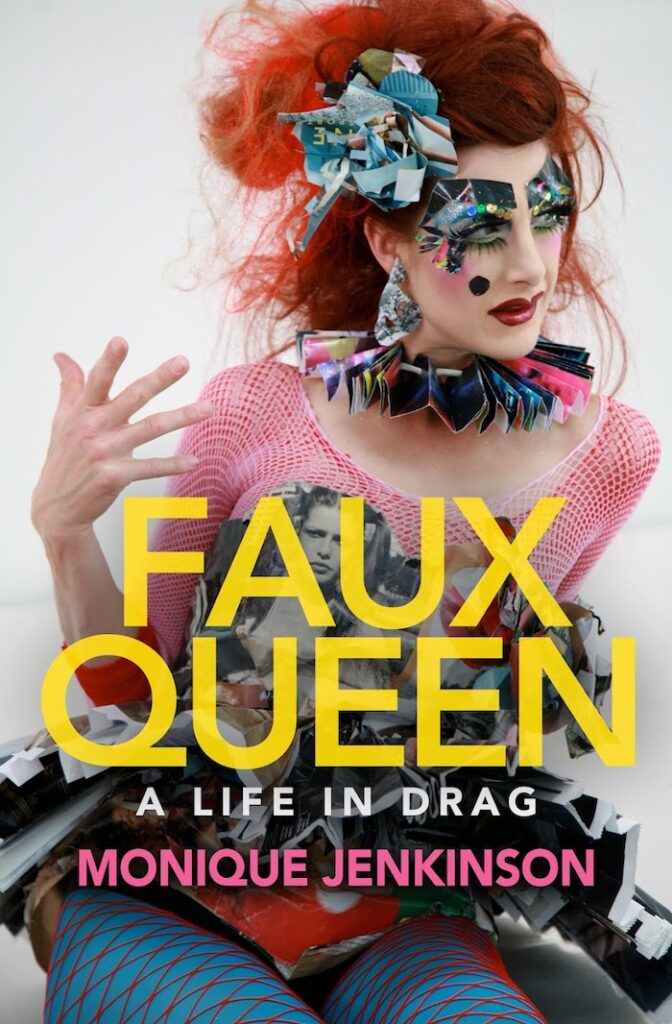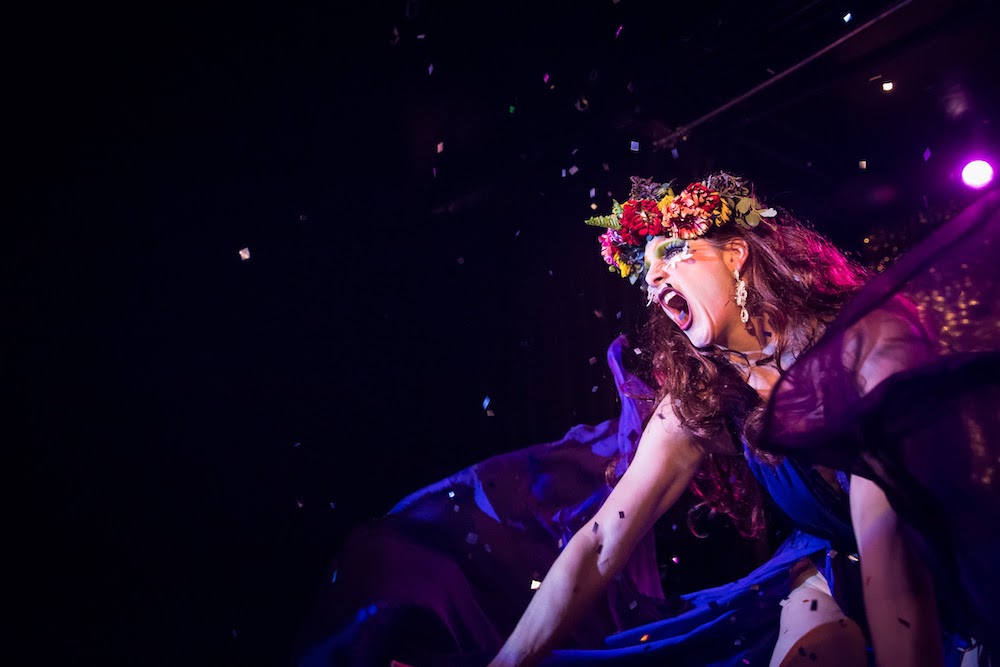It’s no secret that in this sexist world, women have to work twice as hard as men just to stay on their heels. Even when these men wear wigs, false eyelashes and real heels.
Monique Jenkinson learned that lesson when she stepped into her drag persona, Fauxnique, at Trannyshack, Heklina’s unique Tuesday night drag show at The Stud. Or when she fought to break floors and break ceilings by becoming the first cisgender woman to be crowned drag queen at Miss Trannyshack 2003.
This win cannot be understated, even in 2022, as talk show host and producer Andy Cohen made clear on a recent episode of Bravo’s Watch what’s happening live. In an interview RuPaul’s Drag Race alum Shangela, Cohen simply couldn’t fathom the inclusion of cisgender woman Victoria Scone on the UK edition of the popular drag competition franchise – 18 years after Fauxnique won her coveted title.
“How is a woman a drag queen?” asked the talk show host, 24 years after Ana Matronic became the first cisgender woman to reach the finals of the annual Trannyshack competition in 1997. “It doesn’t matter your gender, this is your show,” a replied Shangela. And Fauxnique can certainly put on a show.
But the classically trained dancer didn’t get up to speed from the get-go – female queens didn’t come with instruction manuals in her early days. There was not RuPaul’s Drag Race, Drag Brunch and Drag Queen Story Hour to show her the way. So she relied on drag moms like Juanita More! and Glamamore, who would become his lifelong friends.
His new book, Fake Queen: A Life in Dragchronicles her journey from a suburban ballet-obsessed misfit in the 70s and 80s to a rising star in San Francisco’s alternative drag scene in the 90s, to drag royalty and acclaimed performance artist in the 2000s. But beneath the artifice of wigs, eyelashes, makeup, and heels, the book is really about the profound self-discoveries, friendships, and feminism that Jenkinson discovered along the way.
As Mr. David (aka Glamamore) told Fauxnique after winning Miss Trannyshack, “It’s the most feminist thing you’ve ever done.”
I spoke to the performance artist, ready to celebrate the release of her new book at Oasis on Saturday the 19th with her very own “drag queen story hour”—about being a woman in a man’s world, proving herself a fake queen and feminist, and the five words every budding drag performer should know.
48 HILLS For those who weren’t there, how was the particular era of San Francisco nightlife and drag queen that you cover in your book different from today?
MONIQUE JENKINSON It was more permissive and wilder in many ways. The club I came to was a product of punks, art nerds and club kids who already rejected drag mainstreaming. It had to do with the time, but also with the place. As anarchic as it was, it was a safe space for gay people. We didn’t have makeup tutorials or social media, so teaching and learning about makeup, for example, happened in the in-person creative community. Also, what happened at the club tended to stay at the club. We had a video, but we couldn’t share it instantly.
48 HILLS If you had to sum it up in a few sentences, what attracted you to flirting and becoming a drag performer?
MONIQUE JENKINSON When I first saw myself in false eyelashes when I was 15, I knew the aesthetics and practices were for me, but I didn’t know what the culture would be. The aesthetics and the practices appealed to me, but once I became a drag performer, it was the friendships and the rigor and regularity of performance practice that held me back.

48 HILLS Why do you think you won Miss Trannyshack 2003? Did you understand the importance at the time of being the first cisgender woman to win this honor?
MONIQUE JENKINSON My performance really landed with the audience and the judges. I didn’t expect to win, but the response has been staggering – intense, transformative energy. I think I understood and didn’t understand the meaning. This energy from the audience felt like a deep magical expansion and connection with a community that was already mine. It felt right to me, but I also think I needed a bit of a step back to see the bigger meaning. I think winning big in a “man’s world” is very feminist. But to claim female performance on my own terms and be validated by a big club filled with loving fans, mostly gay men, is my idea of feminism.
48 HILLS You use a lot of drag terminology in your book. What do you think are five words every budding fake queen should know?
MONIQUE JENKINSON Kiki: A deep and real conversation. Preferably in person. Good Judy: A friend you could enjoy a kiki with. Mary: A name you could call your Good Judy. Hat: A wig (according to the late great Nikki Starr). Beat: As a noun (your complete state of drag-faced makeup—“Fierce beat, Mary!”) or verb (what you might do to your face or your hat).
48 HILLS You also use words and talk about issues in the book that some might find controversial/triggers in 2022. Please explain this choice.
MONIQUE JENKINSON Well, there really was no way to use the language of the time when writing a memoir. The name of the drag title I won, Miss Trannyshack, encompasses language that we don’t use anymore, but the win and the club is really the genesis of my whole drag story, so in a way, this wasn’t even a choice. Or rather, to choose differently would be to choose not to write about it at all. All the words I use, I try to use them in context and explain that context.
I’m not claiming that language doesn’t matter or that it should be a big scrum. Language matters, and it matters to me. It’s not for me to decide what to do with the t-word once and for all, but I have to use it in the context in which I encountered it at the time and place I’m rendering. To evade this would be dishonest. I tried to be kind and sensitive inside this process.

48 HILLS So many women have told me over the years that they wanted to enter gay spaces but felt like they were an intrusion. What would you tell them about your own experience to help them overcome this obstacle?
MONIQUE JENKINSON I was truly invited into every gay (mostly male) space I walked into, and welcomed once there, so I never felt intrusive, or if that was the case, it didn’t last long. I think it’s good to ask what kind of energy you bring to a space. I don’t feel like I belong in every gay space I enter, and I don’t tend to stay long in ones where I don’t feel like I belong. Go with friends who are already at your place or try to make it once there. If this seems like the kind of place where it’s easy to make friends, this is probably your space too. You’ll know. Go where it’s warm.
48 HILLS Can you talk about how women in the 90s and 2000s (including you) helped feminism so that young people today can better understand the contribution of Gen Xers to the fight for equality?
MONIQUE JENKINSON I think Gen X feminists have done a lot to stand out and reconfigure sexuality, agency, and femininity. I don’t necessarily believe in the strict separation of the “waves” of feminism, but we were questioning the rules established by the “second wave”. Rules like: high heels are tools of the patriarchy. We got a lot of things like lipstick and heels back. With that, we also continued the good groundwork of the second wave with things like “take back the night,” the idea that you should be able to walk around safely whenever you want and wear whatever you want. That you could be a feminist doing punk music or knitting art and these fashions could be equally valuable to the culture.
48 HILLS You say in the book that women’s stories are often ignored. What made you go against that belief and finally publish your own story? What do you hope readers take away?
MONIQUE JENKINSON I don’t think I will be ignored, but it can be truly disheartening to see women’s stories, projects and contributions repeatedly pushed aside and erased for all sorts of reasons. However, if you do not contribute, you guarantee that your story will not be heard. A lot of people told me it was a story they wanted to hear. It really sustained me through the years it took to put it together, through the ups, downs and discouragements. I hope readers find joy and depth. I hope people who were there at the clubs I write about will feel like they’re there again and those who weren’t there will wish they were there. I hope this sparks a lively and complex conversation, which it already has. And I hope readers will want to talk about it with me!
Fake Queen: A Life in Drag – Book PartySat/19, $10. Tickets and more info here.
 Xoven Agricultor
Xoven Agricultor



